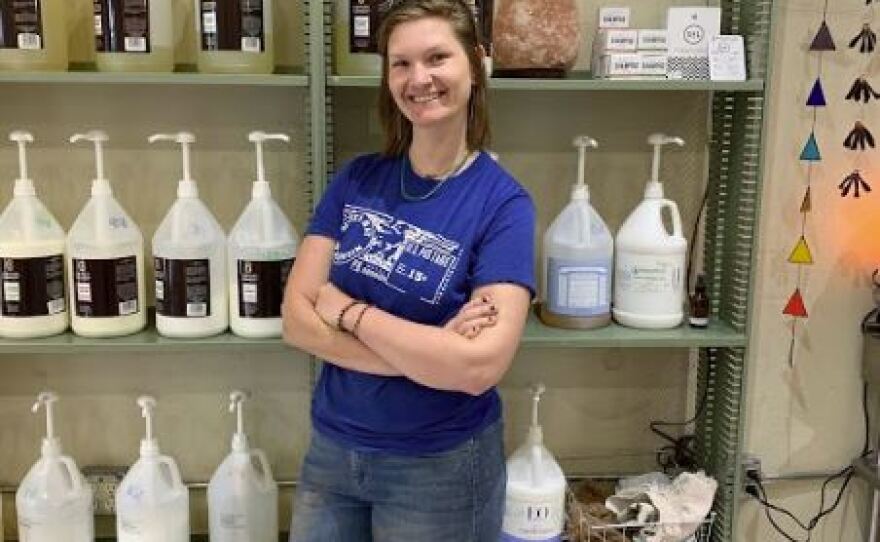Environmental sustainability is on the rise across the nation – with increases in sustainability practices through corporations and individuals alike, according to Nielson. Here in the Ozarks, we’re seeing the same thing on a local level.
Ashley Krug is with Springfield Environmental Services.
“At our recycling centers, even our household chemical collection center and yard waste facility, we’ve seen a trend in more and more people using them all of the time,” said Krug.
Krug says that millennials are currently the least likely to recycle in our community.
“Convenience is key. And so if it’s not convenient, people aren’t going to do it. So one of the things that we really work to do is to help to not only educate about how to recycle right, or to use our facilities appropriately, but really make it convenient for them is the number one step,” said Krug.
Big Impacts
Large institutions in the area, like Missouri State University, are also working to increase sustainability. MSU’s Sustainability Coordinator Doug Neidigh is new to the position but already has big ideas on how to grow the program, making sure everyone on campus has access to these opportunities.
“I think there’s a very strong sustainability culture here. I think it’s really up to us, as faculty and staff, and then student groups to really embrace that and see how we can promote it. How can we give them more avenues to engage?” said Neidigh.
“Yeah, and I think that’s totally right because one thing I hear from students all the time is, ‘How can I be a sustainable college student?’ ‘Can we come up with a way that we can compost in the dorms? Is that something we can do? How do we do that?’” said Megan Brannen.
That’s Megan Brannen, president and co-founder of Missouri State University’s Green Student Alliance. She says that some of the most popular sustainable trends on campus are refillable water bottles and recycling.
Individual Impacts
When it comes to individuals, many people are following the growing trends and finding what works for their own lifestyles.
“My name’s Nancy Quinn and my sustainability journey basically started out of need, which required me to ride a bike pretty much everywhere.”
Quinn says that biking does more than just reduce carbon emissions—it also saves her money and keeps her in shape.
“It does take a little bit of planning ahead, but if you pick a nice day, really, all you need to do is hop and go,” said Quinn.
Springfield resident Bill Schultz says that composting food waste was a big factor in reducing what he sent to the landfill.
“I feel like a lot of times I’m taking out a trash bag because it smells awful and if you’re not putting food waste in there, it doesn’t do that,” said Schultz.
Ashley Krug from Springfield Environmental Services notes that the city puts 33,000 tons of food waste into the landfill each year. The organization now offers home composting classes in an effort to reduce this amount.
The Springfield Compost Collective, formed just last year, works with the community to make composting a more common practice. Businesses can sign up to have their food scraps picked up by the Collective to be composted. Residential food scrap pick-up is coming soon.
Another tip from Schultz – watch out for packaging.
“Try on build goods services, whether that’s at the grocery store or there’s like the bulk soap shop. That was the single thing that saved me so much waste. No more of the paper boxes or the cellophane bags,” said Schultz.
Retail Impacts
Bulk soap stores aren’t widespread in the U.S. yet, but they are popular in other parts of the world for reducing and reusing containers. Here’s how it works: Customers come in with containers and fill them up with cleaning products, shampoos, and other soaps. And there’s one in downtown Springfield – the SOAP Refill Station, run by Anne Dezort.
“We’ve kept over 4,000 containers out of the landfill, waterways, or even the recycling center,” said Dezort.
That’s 4,000 containers in just the eight months that SOAP has been open. Dezort knows that a store like hers can be intimidating at first. She offers a little advice to make it easier.
“Just go. Walk in, see what they have, see how it works and then leave. And then simmer on that and decide how we can help you in your path to make less of an impact. Because that’s our number one goal,” said Dezort.












